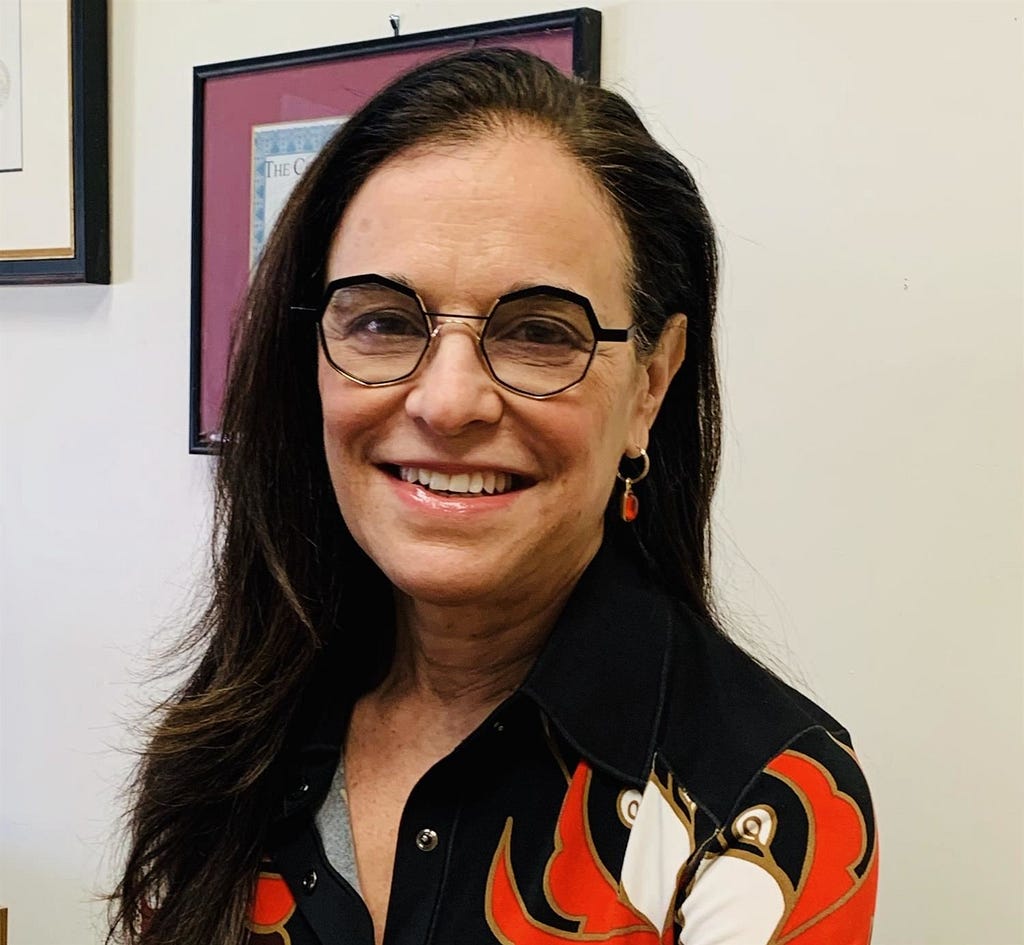Dr Valerie Feit of Enrichment Education Academy: 5 Things That Should Be Done To Improve The US Educational System

After-school programs for underperforming students must help them identify their strengths and interests as well as providing talent development opportunities.
As a part of my interview series about the things that should be done to improve the US educational system I had the pleasure to interview Dr. Valerie Feit.
Dr. Feit specializes in school counseling, gifted and talented education, and school redesign. Her professional work is an outgrowth of a lifelong passion for doing, teaching, and learning. She has spent more than 20 years as a school administrator as Director of School-wide Enrichment for the Rye Neck School District, located in Mamaroneck, New York, and is currently the Director of Independent Learner Program, https://enrichmenteducation.org/
Thank you so much for doing this with us! Our readers would love to “get to know you” a bit better. Can you share the “backstory” behind what brought you to this particular career path?
With over 20 years of experience as an educational program developer and mentor for high-ability, motivated students, I have inspired hundreds of young people to develop real-world projects that highlight their strengths and reflect what is most meaningful to them. As a result, my students have gained acceptances to the most prestigious colleges and universities in the United States and abroad and are professionals in a wide variety of fields. My passion for helping teens develop their talents is motivated by my experiences as a ballet prodigy who joined a professional ballet company at the age of sixteen. From those early experiences meeting real world standards, communicating with adults, and finding resources for solving problems, I learned that when young people are empowered with the tools they need and opportunities to use them, they are capable of great things.
Can you share the most interesting story that happened to you since you started your career? Can you tell us what lesson you learned from that?
At 15 years old, my parents left me alone in New York City for six months while they took a freighter down the coast of Africa. While they were away, I joined a ballet company, ran a rent strike, took music at Juilliard, and French at the Alliance Francaise. What I learned is that teens are far more resilient, resourceful, and thoughtful than they are given credit for.
Are you working on any exciting new projects now? How do you think that will help people?
I am super excited about my new venture, Independent Learner Program, which provides individualized mentorships to middle and high school students who share my passion for real-world, project-based learning. I am working with students who are preparing for the complexities of the future with opportunities to impact their communities and who use ethical reasoning and analytical problem-solving in non-traditional settings.
Can you briefly share with our readers why you are an authority in the education field?
I hold a Doctorate in Education and have over 20 years of experience as a school district leader, enrichment program developer, and mentor for kids. Additionally, I am the co-author of Student Research for Community Change which was published by Teachers College at Columbia University (2020). My television program, Education Today, airs on LMC-TV this fall.
Ok, thank you for that. Let’s now jump to the main focus of our interview. From your point of view, how would you rate the results of the US education system?
Young people need to be future-ready. To continue to excel, American public education must foster can-do attitudes and encourage creativity. While there are comparative international measures of academic achievement in which American students do not rank alongside other developed nations, our students outperform other countries in innovative design and technologies. Federal, State, and local governments need to recognize this distinguishing characteristic and build on it.
Can you identify 5 areas of the US education system that are going really great?
1. STEM education is growing and now includes many more female participants in school science and engineering programs.
2. Distributed educational resources are readily available online.
3. Awareness of social-emotional learning (SEL) has increased student engagement and achievement.
4. College and career readiness programs have targeted underrepresented populations.
5. Students are increasingly motivated to get involved in global concerns such as climate change and cross-cultural understanding.

Can you identify the 5 key areas of the US education system that should be prioritized for improvement? Can you explain why those are so critical?
An increasingly complex global world will challenge the tenacity and effectiveness of America’s future leaders. As a nation, we need to move beyond our Industrial Era public education system and address funding deficits in innovative programs that provide opportunities for young people to develop leadership capacities, field-test ideas, and explore solutions to emerging issues. Today’s students need more computer science exposure, an understanding of artificial intelligence (AI), experiences collecting and analyzing large amounts of data, and chances to explore creative self-expression.
- K-12 hands-on talent development opportunities need to be made available for all students.
- Teachers’ salaries need to increase to a level that is commensurate with other professionals.
- Educational decisions need to be de-politicized and re-focused on what knowledge and skills are most useful in our fast-changing society.
- Climate education needs to be integrated across disciplines.
- Parents and other stakeholders must encourage and support the hard work that teachers do every day.
How is the US doing with regard to engaging young people in STEM? Can you suggest three ways we can increase this engagement?
STEM engagement has increased in the past 10 years and most schools have increased opportunities for young people to participate in mathematics and science programs. There is more to do.
1. Science research, engineering, design, and computer science needs to be offered starting at the elementary level.
2. Awe and wonder needs to be cultivated in the natural world and in laboratories so that students find STEM investigations to be joyful and meaningful.
3. Funding increases need to target teacher capacity, equipment availability, and connections with universities and industries.
Can you articulate to our readers why it’s so important to engage girls and women in STEM subjects?
Girls and women tend to be self-judgemental and drop science pursuits when the content and competition becomes strong. Additionally, girls and women often feel that they will not be capable of balancing a STEM career with the demands of family life. Female perspectives, creativity, and knowledge are too valuable to waste and more effort needs to be made to show girls and women that they can succeed professionally and personally in STEM fields.
How is the US doing with regard to engaging girls and women in STEM subjects? Can you suggest three ways we can increase this engagement?
Statistics show that engineering and health-related fields are attracting more female students than in the past. However, there is a lot of female attrition from STEM careers over time. To address this we need to:
- Address gender inequalities (pay, representation, and bias) at all levels of STEM education and careers.
- Encourage young girls to think of themselves as future STEM leaders and provide them with role models.
- Improve childcare availability for upcoming professional women.
If you had the power to influence or change the entire US educational infrastructure, what five things would you implement to improve and reform our education system? Can you please share a story or example for each?
Wow. That is a big question and thank you for asking it.
- All students need real world project-based learning opportunities that focus on ethical reasoning and analytic problem solving.
- All students need exposure to AI, data-driven analytics, computer science, and design thinking.
- Accountability measures for school districts need to expand beyond teach-and-test metrics which spill over into teacher evaluations.
- After-school programs for underperforming students must help them identify their strengths and interests as well as providing talent development opportunities.
- Climate education needs to be integrated across disciplines.
Can you please give us your favorite “Life Lesson Quote”? Can you share how that was relevant to you in your life?
My mother always told me, “If you don’t ask, you don’t get.”
Communication is a key component of advancement in life whether that advancement is a new opportunity, new information, or a new friend.
We are blessed that some of the biggest names in Business, VC funding, Sports, and Entertainment read this column. Is there a person in the world, or in the US, with whom you would love to have a private breakfast or lunch, and why? He or she might just see this if we tag them 🙂
Okay, I am going for big game here. I want to speak with Kamala Harris about how to develop a national outreach that encourages creativity, vision, and self-expression in children who are facing economic and social challenges that have limited their aspirations. Actually, I will speak with anyone who wants to discuss this with me.
How can our readers further follow your work online?
Parents, educators, professionals, and students, please go to my website: www.enrichmenteducation.org or email me at: valerie@enrichmenteducation.org If you are interested in being a guest on Education Today, I am happy to discuss that with you.
Thank you so much for these insights! This was so inspiring!
Dr Valerie Feit of Enrichment Education Academy: 5 Things That Should Be Done To Improve The US… was originally published in Authority Magazine on Medium, where people are continuing the conversation by highlighting and responding to this story.
